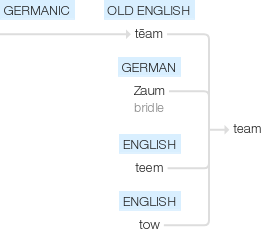Team
Old English tēam ‘team of draught animals’, of Germanic origin; related to German Zaum ‘bridle’, also to teem1 and tow1, from an Indo-European root shared by Latin ducere ‘to lead’.
wiktionary
From Middle English teme, from Old English tēam(“child-bearing, offspring, brood, set of draught animals”), from Proto-Germanic *taumaz(“that which draws or pulls”), from Proto-Germanic *taugijaną, *tugōną, *teuhōną, *teuhaną(“to lead, bring, pull, draw”), from Proto-Indo-European *dewk-(“to pull, lead”). Cognate with Scots team, teem(“a chain, harness”), West Frisian team(“bridle, team”), Dutch toom(“bridle, reins, flock of birds”), German Zaum(“bridle”), Norwegian tømme(“bridle, rein”), Swedish töm(“leash, rein”). More at teem, tie, tow.
team
etymonline
team (n.)
Old English team "descendant, family, race, line; child-bearing, brood; company, band; set of draft animals yoked together," from Proto-Germanic *tau(h)maz (source also of Old Norse taumr, Old Frisian tam "bridle; progeny, line of descent," Dutch toom, Old High German zoum, German Zaum "bridle"), probably literally "that which draws," from PIE *douk-mo-, from root *deuk- "to lead."
Applied in Old English to groups of persons working together for some purpose, especially "group of people acting together to bring suit;" modern sense of "persons associated in some joint action" is from 1520s. Team spirit is recorded from 1928. Team player attested from 1886, originally in baseball.
team (v.)
1550s, "to harness beasts in a team," from team (n.). From 1841 as "drive a team." The meaning "to come together as a team" (usually with up) is attested from 1932. Transitive sense "to use (something) in conjunction" (with something else) is from 1948. Related: Teamed; teaming. The Old English verb, teaman, tieman, is attested only in the sense "bring forth, beget, engender, propagate."
